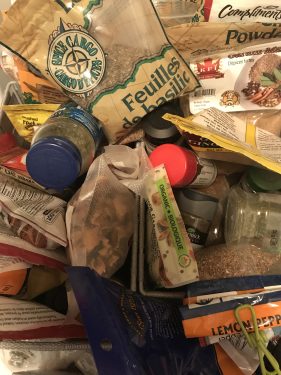Or spice basket, or bin, or wherever you keep them all! Giving your spice drawer a once through may be the best way to get some great flavours back into your dishes this summer!
In this post we cover why it’s a good idea to check the state of your herb and spice drawer, what a herb and a spice is, and tips for how to store them.
Why refresh the spice drawer?
There are some corners of the Internet that claim that dried herbs and spices don’t really have an expiry date. But we don’t quite agree. Over time, there are some herbs (especially) and spices that can fade in flavour and intensity, and some spice packages come with best before dates on them.
We get it: life gets busy. You had a house move or two behind you. Or a new family member. You get settled and throw together a simple meal. And you reach for the same set of spices again and again. And, those ones get used up and then you buy more of them. But there are others outside that core set of often used spices that might not get reached for as much. And, those can sometimes lose their punch over time (hello asafoetida and ajwain!). (Even if this doesn’t quite describe you, we think you know what we mean…)
So when things slow down and you finally have a bit more time to get back to more exciting or experimental cooking… the last thing you want is to reach for the toasted sesame seeds and realize they smell weird when you pop the cap because they’ve gone rancid.

What a spice? A herb? What’s the difference?
Herbs are typically from the leafy parts of a plant: fronds and leaves. Common herbs are parsley, oregano, thyme and basil.
Spices usually come from the other parts of a plant – the roots, the stems, the bark, the dried seeds or even the dried fruit. Cinnamon is the bark of the cinnamon tree. Nutmeg is a dried seed (if you buy them whole).
Best ways to use and store your herbs and spices
Tip 1: Our number one tip for best use for your spices is to always measure out or separate into a palm or measuring spoon the amount of spice you need. Don’t hold the spice bottle or bag directly above a steaming hot pot. That introduces moisture and heat, which can quickly affect the freshness!
Tip 2: Keep herbs and spices dry, cool and dark, and you’ll get an A+ in the kitchen.
Tip 3: Something that may also help keep your spices fresh is how they are stored. This may also be sometime to consider when you refresh your spice drawer. Is it time for a format change? If you buy bigger amounts of your herbs and spices in plastic bags and tend to just use a clip to hold the top together, then you might be letting flavour and freshness out (or, as above, heat and moisture in).
From what we can see, the best way to keep dried herbs and spices fresh are to store them in glass bottles. (And maybe this is already how you purchase them.) It’s often a bit of an investment to go for the little glass bottles, but for freshness, it’s a good way to go. And you don’t need to do it all at once! For spices that you buy in small quantities or in plastic bags, transferring them to glass containers will keep them fresher for longer.
Altogether, these tips will help keep your herb and spice drawer fresh for that next great dish.
Back to news


